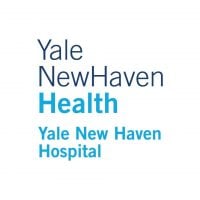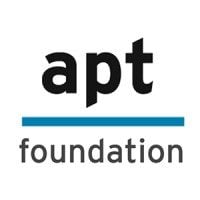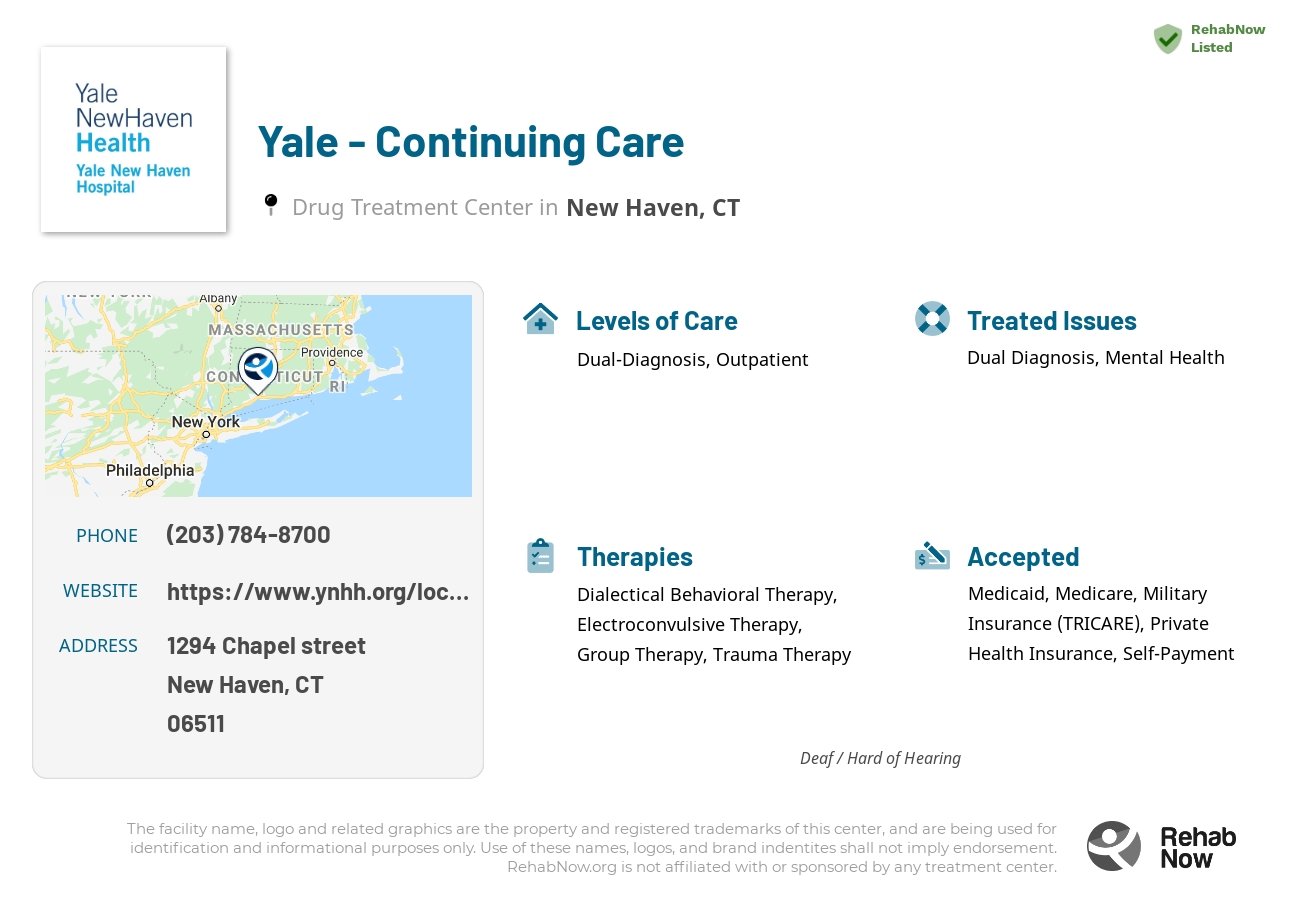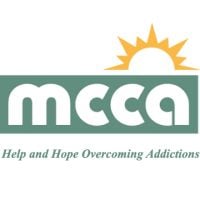
Yale - Continuing Care
Drug Rehab Center in New Haven, Connecticut
- Mental Health
- Dual Diagnosis
Yale - Continuing Care is an addiction and substance abuse treatment center in Connecticut offering evidence-based therapies, personalized treatment plans, and various therapies including medication-assisted treatments and aftercare services.
About Yale - Continuing Care in Connecticut
Yale - Continuing Care is an addiction and substance abuse treatment center located in New Haven, Connecticut. The facility is dedicated to providing individuals with evidence-based therapies, residential care, and outpatient programming. Yale - Continuing Care is staffed with a multidisciplinary team of trained addiction specialists, including physicians, psychologists, counselors, nurses, and psychiatrists. This team works to provide customized treatment plans tailored to meet the needs of each individual.
Yale - Continuing Care offers a range of therapies to help individuals recover from addiction. These include cognitive-behavioral therapy, dialectical-behavioral therapy, art therapy, spiritual counseling, and intervention services. In addition, they provide relapse prevention planning and aftercare services to help individuals maintain their sobriety. Yale - Continuing Care also offers medication-assisted treatments, like Suboxone and Vivitrol, as well as nutritional guidance, yoga and meditation, and gender-specific services.
Yale - Continuing Care is certified by The Joint Commission and licensed by the Connecticut Department of Mental Health and Addiction Services. They also have earned the Connecticut Quality Improvement Award for their contributions to the field of addiction treatment. They are committed to providing high-quality care and strive to create a safe, supportive environment to foster recovery.
Genders
Ages
Modality
Additional
Conditions and Issues Treated
Recovery is not simply about stopping drug use. Recovery is working with addiction while recovering mental health issues that are fueling the addiction in the first place.
Levels of Care Offered
This center offers a variety of custom treatment tailored to individual recovery. Currently available are Dual-Diagnosis, Outpatient, with additional therapies available as listed below.
Outpatient treatment is considered the lower intensity level of addiction treatment. It’s ideal for early phase addiction or lower intensity addictions. It may include weekly sessions instead of daily. It may include weekly sessions instead of daily. Peer group support, 12-step programs, and individual counseling may still be involved but at a lesser frequency than an intensive outpatient program. It is a good choice for someone who doesn’t need to go through a medically supervised detox and who has a supportive home environment. It requires motivation and dedication to commit to the program without constant monitoring.
Therapies & Programs
Groups typically involve meetings with other recovering addicts who can relate to one another’s experiences. They might meet in person or online and typically focus on the process of staying sober rather than overcoming a specific addiction.
In these groups managed by Yale - Continuing Care, addicts can build a sense of community and develop strong emotional connections with others who understand what they are going through. These beneficial relationships can help addicts overcome their cravings and prevent relapse at any point during the recovery process.
In general, trauma therapy is a clinical process that helps individuals deal with mental stress often caused by traumatic events. The therapist helps the person identify, understand, and work through the problem. This is done with the help of talking about it in group or one-on-one counseling sessions. Therapists use relaxation, role-playing, art, and music to help the person open up about what is bothering them.
There are many different types of trauma therapists, such as psychiatric nurses and counselors. Not everyone is a good candidate for this type of therapy; it is generally reserved for people who have recently experienced a traumatic event and struggle to get over it. It is often done for children, teenage victims of sexual assault, and war veterans.
Dialectical Behavior Therapy (DBT) is a type of therapy created in the late 1980s and early 1990s to help people with high rates of suicidal behavior. DBT helps people learn how to live a life that is no longer controlled by overwhelming emotions and urges. It is beneficial in treating drug addiction because it helps patients understand and cope with their cravings for drugs or alcohol rather than turning to those substances as a way of coping.
There is hope for people who are addicted to drugs and alcohol. Cognitive Behavioral Therapy (CBT) is the solution. CBT focuses on the underlying thoughts and behaviors that caused the addiction problem in the first place and may cause a relapse. This type of psychotherapy addresses negative feelings common in substance abuse disorders. It helps to change them by restructuring thought patterns. It’s about removing negative thoughts and providing long-term benefits while promoting self-awareness, self-control, and healthy ways to respond to negative thoughts. These sessions can be done by themselves or as part of combination therapy.
Payment Options Accepted
For specific insurance or payment methods please contact us.
Is your insurance accepted?
Ask an expert, call (888) 674-0062
Yale New Haven Health Associated Centers
Discover treatment facilities under the same provider.
- Yale - Adult Intensive Outpatient in New Haven, CT
- Yale New Haven Hospital Continuing Care Clinic in New Haven, CT
- Yale - Behavioral Health Services and Intensive Outpatient in Hamden, CT
- Yale - Child and adolescent Outpatient Psychiatric Services in New Haven, CT
- Yale - Psychiatric Hospital in New Haven, CT
Learn More About Yale New Haven Health Centers
Additional Details
Specifics, location, and helpful extra information.
New Haven, Connecticut 6511 Phone Number(203) 784-8700 Meta DetailsUpdated November 25, 2023
Staff Verified
Yale - Continuing Care Patient Reviews
There are no reviews yet. Be the first one to write one.
New Haven, Connecticut Addiction Information
Connecticut has a higher rate of substance abuse and addiction than the national average. The state ranks in the top 10 in the country for illicit drug dependence among those ages 18 to 25. In 2010, there were 9,211 people admitted to an alcohol treatment facility for alcohol abuse combined with a secondary drug. Connecticut ranked fifth in the United States of America for the number of fatalities involving drunk driving in 2014.
There are 9,000 people addicted to drugs in New Haven, Connecticut. The most common drugs are methamphetamines and marijuana. Alcohol is also abused by many residents. 20% of Connecticut residents have a substance abuse disorder, and 28,409 people died from drug overdoses in 2015. Drug treatment centers in New Haven, CT, offer detoxification. The therapeutic portion of treatment may involve individual counseling, group therapy, and recreational activities.
Treatment in Nearby Cities
- Schenectady, CT (116.1 mi.)
- Torrington, CT (35.2 mi.)
- Bethel, CT (25.1 mi.)
- Plainfield, CT (58.8 mi.)
- Enfield, CT (52.1 mi.)
Centers near Yale - Continuing Care



The facility name, logo and brand are the property and registered trademarks of Yale - Continuing Care, and are being used for identification and informational purposes only. Use of these names, logos and brands shall not imply endorsement. RehabNow.org is not affiliated with or sponsored by Yale - Continuing Care.







